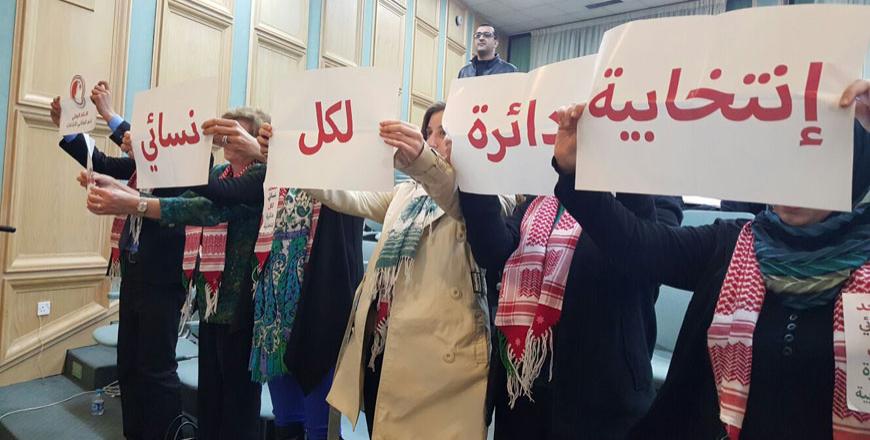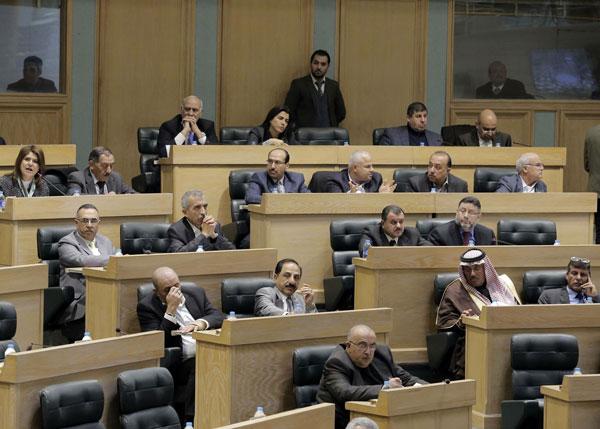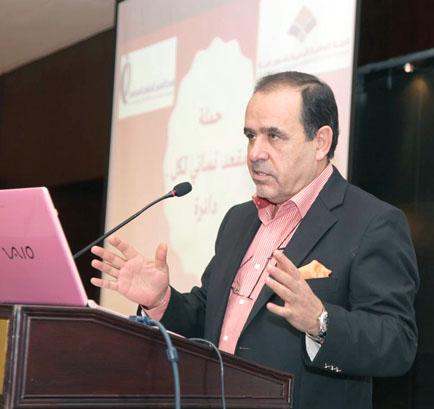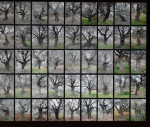You are here
House maintains women’s quota in elections bill at 15 seats despite demands for 23 seats
By Rana Husseini - Feb 22,2016 - Last updated at Feb 22,2016

Women’s rights activists hold placards calling for a seat for women in each electoral district under the draft elections law during a Lower House session on Monday (Photo by Rana Husseini)
AMMAN — The Lower House of Parliament on Monday voted to maintain the women’s quota at 15 seats despite repeated demands by the women’s movement to increase it to 23.
The Lower House was deliberating Article 8, paragraphs A, B, C and D of the 2015 draft elections law, of which section B designated 15 seats for women.
Members of a coalition formed by women’s rights movements have been attending House sessions to discuss the draft elections law to reiterate their demands.
“This is a disappointing outcome. The way the Lower House Speaker [Atef Tarawneh] managed the debate and the voting did not allow the deputies to voice their real stand on Article 8 Paragraph B,” said Jordanian National Commission for Women Secretary General Salma Nims.
The debate on Paragraph A lasted almost two hours, after which Tarawneh ended the discussions before all deputies had the chance to make suggestions or proposals on Article 8 with all its sections.
His move was met with heavy criticism by many deputies who did not get the chance to speak and many were screaming and shouting in protest.
The speaker then called for a vote and Article 8 section A, B, C and D, passed without any further deliberations by the MPs on section B, C, and D.
Later on Monday, Tarawneh released a statement defending his decision, saying that over 50 lawmakers had the chance to speak about Article 8 over three hours.
In the statement, carried by the Jordan News Agency, Petra, the speaker said he has received the resignation of Deputy Hind Fayez (Central Badia), and it will be added to the agenda of the House’s next session for discussion.
Fayez had submitted her resignation because she was not given the chance to speak during the House’s deliberations over the elections bill.
Members of the coalition attending the session from the Parliament gallery carried posters reiterating their demand for a seat for women in each constituency after the voting, prompting security personnel to ask them to leave.
However, several deputies intervened and the coalition members returned to their seats to watch the remainder of the morning session.
Nims told The Jordan Times that several deputies promised the coalition that they will call on the speaker of the Lower House to put Article 8 Section B up for debate once MPs conclude discussions of the entire bill.
“We received a promise that they will discuss the bill again so we still have some hope,” she said.
Meanwhile, Deputy Wafaa Bani Mustafa (Jerash, 1st District), who submitted a proposal during the session to designate a seat for women in every constituency, said she will not give up.
“I will continue to lobby for the increase in seats when the right time comes,” Bani Mustafa told The Jordan Times.
Earlier in the session where lawmakers discussed Paragraph A, Deputy Ahmad Jaloudi (Amman, 1st District) recommended maintaining Article 8, Paragraph B as is because “the government decreased the seats of Parliament from 150 to 130, which means the percentage of women now in Parliament was raised from 10 per cent to 11.5 per cent”.
On the other hand, MP Samir Oweis (Irbid, 1st District) reiterated Bani Mustafa’s demands, saying that women should have 23 seats in the Lower House.
Meanwhile, Deputy Mahmoud Kharabsheh (Balqa, 1st District) submitted a proposal cancelling the women’s quota all together, saying that “women should win in direct competition and do not need a quota”.
Speaking at the session, Minister of Political and Parliamentary Affairs Khalid Kalaldeh defended the government’s decision, saying that women could compete for 130 seats unlike men who will only compete for 115 seats.
“This will allow women hopefully to win more seats outside the quota,” the minister told MPs.
The decision to escalate the coalition’s protest and attending sessions from the Parliament’s gallery was made after the Lower House Legal Committee last week endorsed the 2015 draft elections law without taking into consideration the women movement’s demands.
Currently, there are 18 women in the Lower House, 15 from the quota and 3 who won in direct elections.
Related Articles
AMMAN — A civil society coalition plans to organise a sit-in in front of Parliament to demand a seat for women in each of the constituencies
AMMAN — Activists wearing red chequered scarves with stickers reading one seat for women in each constituency occupied part of Parliament’s
AMMAN — A group of Jordanian civil society organisations on Monday said it will refer its demand to increase the number of seats for women i















